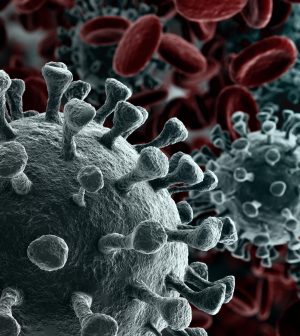- Could Artificial Sweeteners Be Aging the Brain Faster?
- Techniques for Soothing Your Nervous System
- Does the Water in Your House Smell Funny? Here’s Why
- Can a Daily Dose of Apple Cider Vinegar Actually Aid Weight Loss?
- 6 Health Beverages That Can Actually Spike Your Blood Sugar
- Treatment Options for Social Anxiety Disorder
- Understanding the Connection Between Anxiety and Depression
- How Daily Prunes Can Influence Cholesterol and Inflammation
- When to Take B12 for Better Absorption and Energy
- Epsom Salts: Health Benefits and Uses
FDA Approves First Breath Test for COVID

People who suspect they may have COVID-19 could soon find out with a simple breath test that delivers results in three minutes.
On Thursday, the U.S. Food and Drug Administration granted an emergency use authorization for a device called the InspectIR Covid-19 Breathalyzer. The test, which must be administered by a trained operator, demonstrates a high degree of accuracy while taking up no more space than a piece of carry-on luggage.
“Today’s authorization is yet another example of the rapid innovation occurring with diagnostic tests for COVID-19,” Dr. Jeff Shuren, director of the FDA’s Center for Devices and Radiological Health, said in an agency news release announcing the approval. “The FDA continues to support the development of novel COVID-19 tests with the goal of advancing technologies that can help address the current pandemic and better position the U.S. for the next public health emergency.”
InspectIR can run 160 samples per day and may be used at mobile testing sites, hospitals and doctors’ offices. The company can produce about 100 of the machines a week, The New York Times reported.
The test uses gas chromatography gas mass-spectrometry, a technique that separates and identifies chemical mixtures, to spot the presence of five compounds associated with the coronavirus.
Its accuracy was confirmed in a large study of just over 2,400 people, including those with and without symptoms. In the end, the test was shown to have 91.2% sensitivity (the percent of positive samples the test correctly identified) and 99.3% specificity (the percent of negative samples the test correctly identified). The test performed just as well in a follow-up study focused on the Omicron variant.
The test’s approval arrives as the Omicron subvariant BA.2 takes over the country, now accounting for almost 86% of all COVID cases, according to data from the U.S. Centers of Disease Control and Prevention. Several northeastern cities have seen cases climb recently as the subvariant surges, and Philadelphia even brought back its indoor mask mandate this week to try to stem the spread of BA.2.
A positive test should be confirmed through another testing method, such as a PCR lab test, the FDA stressed.
The agency warned that negative tests “should be considered in the context of a patient’s recent exposures, history and the presence of clinical signs and symptoms consistent with COVID-19” and “should not be used as the sole basis for treatment or patient management decisions, including infection control decisions.”
More information
The U.S. Centers for Disease Control and Prevention has more information on COVID-19.
SOURCE: The New York Times
Source: HealthDay
Copyright © 2026 HealthDay. All rights reserved.










